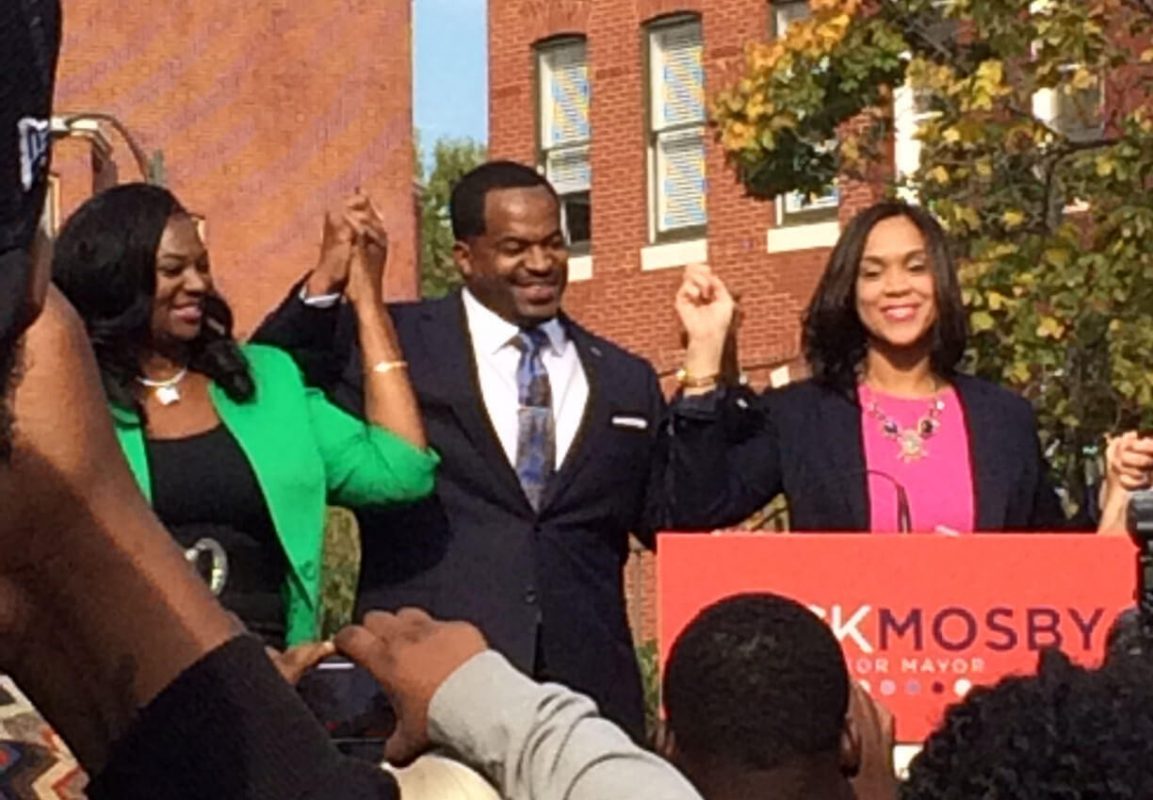
In a small courtyard within a derelict apartment complex slated for demolition, just blocks from the epicenter of this spring’s unrest, City Councilman Nick Mosby made official yesterday what has been rumored for months: He is running for mayor.
Mosby, 36, joins a crowded field of hopefuls that includes former Mayor Sheila Dixon, fellow City Councilman Carl Stokes, and state Senator Catherine Pugh.
Mosby—a Baltimore native who was elected to City Council in 2011—was joined for the announcement by about 300 supporters, including his wife, city state’s attorney Marilyn Mosby, who stood silently by her husband’s side during his announcement.
The Mosbys rocketed into the national spotlight this spring when Marilyn Mosby, in her role as the city’s chief prosecutor, brought charges against six city police officers accused of contributing to the death of Freddie Gray in April. Meanwhile, much of the rioting and peaceful protesting that surrounded Gray’s death consumed Mosby’s 7th District, which encompasses Sandtown-Winchester where Freddie Gray lived, Mondawmin Mall, where Baltimore City public school students clashed with police, and Penn North where some of the worst rioting occurred. Councilman Mosby made almost as much of an impression as his wife during the unrest when a video of him with a Fox News reporter went viral. In the clip, Mosby describes that night’s rioting as “wrong” and “destructive” but also the product systemic neglect and oppresion of young, poor, inner city black men. “This is bigger than Freddie Gray. This is about the social economics of poor urban America,” he said. ” We look at communities like this in urban America—lack of education, lack of commercial development, lack of opportunity—it’s the social economics of it. It has nothing to do with West Baltimore or this particular corner of Baltimore. This could erupt anywhere in socially economically deprived America.”
In his announcement, Mosby hit many of the same themes, positioning himself as a fresh voice and a champion of the overlooked and underserved. “As a father raising two young girls in West Baltimore, you can count on me to fight for better schools, safer streets, more jobs, a transparent government, and better police-community relations,” said Mosby, who lives with his family in Reservoir Hill. “To the young man out there who seems invisible, I see you. To the young woman who feels voiceless, I hear you,” he said.
Mosby emphasized his own journey as proof of this. He grew up in Northeast Baltimore, raised by a single mother. He then graduated from Baltimore Polytechnic Institute and earned a degree in electrical engineering from Tuskeegee University. He also has worked as a network engineer and project manager for companies such as Verizon and BGE.
“I can go into any boardroom downtown, see an issue, develop a plan, and execute on it. But you can drop Nick Mosby on any street corner from East to West Baltimore and I can do the exact same thing,” he said to appreciative applause and cheers from the crowd.
Mosby’s entrance in the democratic mayoral primary—which, in a city where registered Democrats far outnumber registered Republicans amounts to the general election—further shakes up an already unpredictable race. Current Mayor Stephanie Rawlings-Blake announced in early September that she would not seek reelection. Until then, many political watchers were sizing up the race as a contest between former Mayor Sheila Dixon, who was forced to resign amidst scandal in 2010, and Rawlings-Blake who had seen her popularity plummet after this spring’s unrest. With Rawlings-Blake out, some were calling the race Dixon’s to lose, though Dixon was candid in a recent interview with Baltimore magazine about pockets of weak support throughout the city, especially in traditionally white neighborhoods. (An article about Dixon’s comeback attempt is available in the November issue of Baltimore magazine.)
Jeff Smith, an assistant professor of politics and advocacy at The New School in New York City, also spoke to Baltimore for the Dixon article, and said he feels Dixon has a good shot at reelection, but that a candidate like Mosby would be Dixon’s “nightmare scenario.”
“Someone that has decent black support—and especially black elite support—but then total crossover appeal,” would likely threaten Dixon’s base, he posited.
Among those present at yesterday’s rally were City Council president Bernard C. “Jack” Young (who also attended a similar rally of Dixon’s in September) and fellow City Councilman Robert Curran, who represents much of Northeast Baltimore in the 3rd District. Another prominent Baltimorean, whose presence spoke to Mosby’s potential crossover support was Phil Chorney, a cofounder of the Charm City Folk and Bluegrass Festival, who credited Mosby with bringing the festival from the parking lot at Union Craft Brewing in Hampden to Druid Hill Park, where it has flowered into one of the city’s most popular springtime events.
“Councilman Mosby most likely did not grow up listening to bluegrass, but every year he comes out to support us,” Chorney told the crowd.
However, Mosby has a few things working against him, including his late start in the race.
“As a former politician, I know it’s really hard to raise money between Thanksgiving and the end of the year. So . . . you basically only have from January until April to raise money and that’s not very long,” said Smith, a former Missouri state Senator who narrowly lost a Democratic primary to replace retiring Congressman Dick Gephardt in 2004. (Smith was subsequently convicted of two counts of obstruction of justice related to a campaign finance scandal and served a year in federal prison.)
Perhaps the more pressing problem for Mosby is worry that, if elected, his marriage would present a conflict of interest. As The Sun notes in an article today, Mosby “would have authority over the $38 million budget of his wife’s office and her more than 300 employees.” Furthermore, The Sun notes, “City prosecutors have been known to bring charges against wrongdoing by employees of the Police Department or other city agencies. Marilyn Mosby is currently investigating alleged wrongdoing by public housing employees, who are overseen by the mayor’s housing chief. If Nick Mosby were to win, Marilyn Mosby could find herself in a situation where she would be tasked with investigating people on her husband’s staff.”
Though neither Mosby commented on the potential conflict of interest yesterday, Marilyn Mosby did address the topic in an interview with Baltimore in January. When asked if her new role as city state’s attorney conflicted with her husband’s City Council position, she said, “There is no conflict of interest. I am beholden to the constituents who elected me. I’m not beholden to City Council, so there’s never any conflict or should be any appearance of a conflict of interest between my husband being a public servant and myself being a public servant.”
